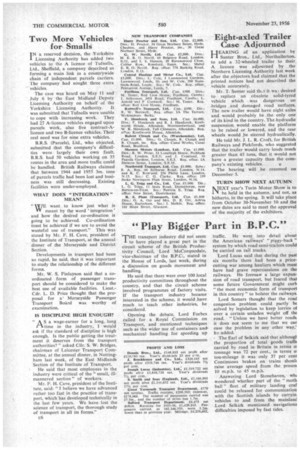Two More Vehicles for Smalls
Page 46

If you've noticed an error in this article please click here to report it so we can fix it.
I N a reserved decision, the Yorkshire Licensing Authority has added two vehicles to the A licence of Tufnells, Ltd., Sheffield, a company described as forming a main link in a countrywide chain of independent parcels carriers. The company had sought three extra vehicles.
The case was heard on May 11 and July 6 by the East Midland Deputy Licensing Authority on behalf of the Yorkshire Licensing Authority. It was submitted that Tufnells were unable to cope with increasing work. They had 27 A-licence vehicles engaged upon parcels work, also five contract-Alicence and two B-licence vehicles. Their real need was for nine extra vehicles.
B.R.S. (Parcels), Ltd., who objected, submitted that the company's difficulties were largely their own fault. B.R.S. had 50 vehicles working on 35 routes in the area and more traffic could be handled. British Railways claimed that between 1944 and 1955 3m. tons of parcels traffic had been lost and business was still decreasing. Existing facilities were under-employed.
WHAT DOES " INTEGRATION " MEAN?
" WE want to know just what is meant by the word ' integration ' and how the desired co-ordination is going to be achieved. Co-ordination must he achieved if we are to avoid the wasteful use of transport." This was stated by Mr. F. IL Cave, president of the Institute of Transport, at the annual • dinner of the Merseyside and District Section.
Developments in transport had been so rapid, he said, that it was important to study the relationship of the different forms.
Mr. W. S. Finlayson said that a coordinated form of passenger transport should be considered to make the best use of available facilities. Lieut.Cdr. L. D. Price thought that the proposal for a Merseyside Passenger Transport Board was worthy of examination.
IS DISCIPLINE HIGH ENOUGH?
"AS a wage-earner for a long, long time in the industry, I would ask if the standard of discipline is high enough. Is the public getting the treatment it deserves from the transport authorities?" asked Clic S. W. Bridges, chairman of Leicester Transport Committee, at the annual dinner, in Nottingham last week, of the East Midlands Section of the Institute of Transport.
He said that most employees in the industry were critical of the " small, illmannered section" of workers.
Mr. F. H. Cave, president of the Institute, said: "I believe we have advanced rather too fast in the practice of transport, which has developed technically in the last few years. We have lost the science of transport, the thorough study of transport in all its forms."
c6
















































































































